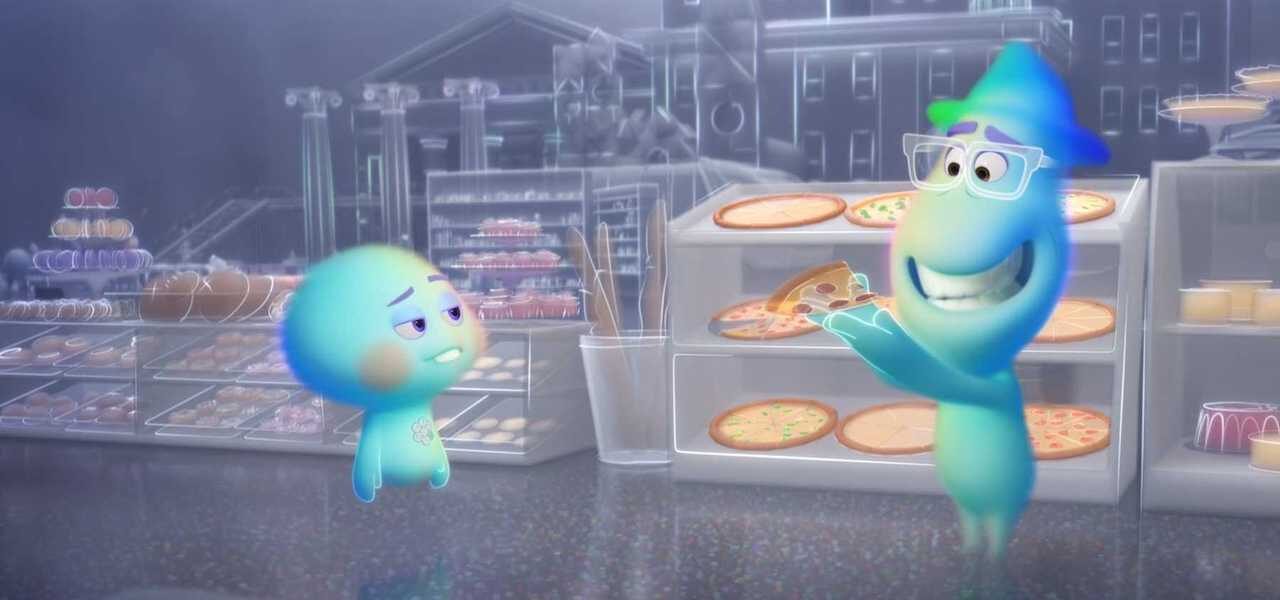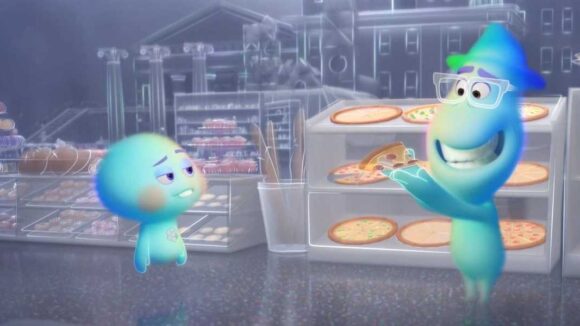

‘Soul’ Review: Pixar’s Meditation On Life, Death, And Jazz Is Its Most Ambitious Film In Years
Only Pete Docter could spin a metaphysical meditation on death, depression, and mid-life crisis into a family comedy that’s fit to come out on Christmas Day. That is when Soul will be released to much of the world (on Disney+); I caught the film this week at the London Film Festival, where it received its world premiere. The pandemic turned my screening into a low-key, wary affair — an atmosphere not conducive to big laughs, but which made me unusually receptive to the film’s more melancholic moments.
Throughout Pixar’s quarter-century history of feature filmmaking, Docter has established himself as the studio’s philosopher-in-chief. The films he has directed to date — Monsters, Inc.; Up; and Inside Out — deliver simple, poignant observations on the wants and fears of humans, via wild fantastical conceits that bring comedy and action aplenty. The formula was perfected in the wonderful Inside Out, which explores the roiling emotions of a young girl by personifying them as bickering sprites that live in her head.
Soul will be endlessly compared to Inside Out, because it resembles that film in concept and sometimes in visual execution. But it also reminded me of the great existential dramas in which the hereafter makes contact with Earth: It’s a Wonderful Life, say, or Wings of Desire. Our protagonist is Joe Gardner (a restrained Jamie Foxx), a middle-school music teacher from New York who dreams of playing piano in the city’s jazz clubs. On the day he’s finally booked for a gig, he suffers an accident, and his soul is transmitted to a celestial realm which he takes to be heaven. It turns out to be more than that: a portal for the recently deceased, but also a training ground for as-yet-unborn souls, and other things besides.
The chief purpose of this realm, which is known as The Great Before, is to prepare fresh souls for life on Earth by developing their personalities (the little sorting offices that assign them character traits evoke the personality islands from Inside Out). We’re never sure how seriously the film endorses this nature-over-nurture vision of human development, but the premise does set up a few middling jokes about personality types at the expense of new-age healers, hedge fund managers, and the like.
Joe’s soul is desperate to return to his body in time for the concert, but the bureaucrats that run the place — vaguely Cubist wire sculptures with soothing voices — have different plans for him. He is roped in to mentor one soul, 22 (Tina Fey), who has languished in this realm for eons, stubbornly refusing to graduate to Earth. A chain of events, which are best kept unspoiled, sees them ricocheting between New York and The Great Before.
Joe doesn’t want to die and 22 doesn’t want to live: the scene is set for the ultimate mismatched-buddy adventure. In a sense, the pair respectively stand for humanity’s greatest fear and deepest despair. These are adult feelings, far removed from the pre-teen rebellion of Inside Out. But the script (by Docter, Mike Jones, and Kemp Powers) manages to examine these extremes of unhappiness in a way that’s palatable to kids, because it filters them through the playful devices of the fantasy world. Still, Soul contains some of the most emotionally raw moments in the Pixar canon.

Harnessing the visual range of animation, the film clearly differentiates the two worlds, and this helps anchor us in an increasingly complex plot. During development, Pixar consulted a spiritual brain trust, including priests, rabbis, and a shaman, about what a soul might look like. The filmmakers plumped for a level of abstraction that seems pitched to please all denominations. The souls are volumetric wisps of air — Casper the Friendly Ghost crossed with emojis — and their realm is a pastel-hued geometric landscape that hums with the comfy sterility of a first-class airport lounge.
New York, on the other hand, is all reds and browns, sharp lighting and naturalistic textures. The contrast extends to the music: The Great Before is scored to the nebular synths of Trent Reznor and Atticus Ross, Earth to Jon Batiste’s rousing jazz score. The jazz club is masterfully animated and subtly lit, with input from cinematographer Bradford Young (Selma); the fact that these venues are suffering terribly in the pandemic gives these scenes an accidental pathos. Joe, Pixar’s first Black protagonist, moves through an African American milieu that was brought to life by co-writer Powers, another Black native of New York. Powers contributed so much to the production that he was eventually promoted to co-director.

As Soul enters its final act, it stumbles. Trying to find redemptive arcs for both Joe and 22, the film delivers a convoluted moral about what makes life worth living. Joe’s passion for his art is a route to happiness, we seem to be told, but his career ambitions are not. This is a sobering message to receive from people who work for a top animation studio. It’s also a little confusing. I cried during Up and Inside Out, but this time I was too busy puzzling out the logic of the film.
These are rare missteps from Pixar, whose scripts are normally polished to perfection. But this is also a charm of Soul: where some of the studio’s recent sequels have politely followed formulas, this one asks big questions and tries bold new ideas. Docter, who was named Pixar’s chief creative officer during this production, is reportedly sidelining franchises and stuffing the development slate with original films. That’s an ambitious vision for the studio, and Soul sets a fine example.
“Soul” will be released on December 25 on Disney+. It is due to receive a theatrical release in territories where Disney+ doesn’t operate. It is 100 minutes and rated PG.
Director: Pete Docter
Producer: Dana Murray
Executive producers: Dan Scanlon, Kiri Hart
Co-director: Kemp Powers
Story and screenplay: Pete Docter, Mike Jones, Kemp Powers
Story supervisor: Kristen Lester
Original score: Trent Reznor, Atticus Ross
Production designer: Steve Pilcher
Visual effects supervisor: Michael Fong
Animation supervisors: Jude Brownbill, Bobby Podesta
Character supervisors: Michael Comet, Junyi Ling
Sets supervisor: Jun Han Cho
Director of photography: Matt Aspbury, Ian Megibben
Editor: Kevin Nolting
Jazz compositions and arrangements: John Batiste
Cast: Jamie Foxx, Tina Fey, Graham Norton, Rachel House, Alice Braga, Richard Ayoade, Phylicia Rashad, Donnell Rawlings, Ahmir-Khalib Thompson (a.k.a. Questlove), Angela Bassett, Cora Champommier, Margo Hall, Daveed Diggs, Rhodessa Jones, Wes Studi, Sakina Jaffrey, Fortune Feimster, Calum Grant, Laura Mooney, Peggy Flood, Zenobia Shroff, June Squibb, Ochuwa Oghie, Jeannie Tirado, Catherine Cavadini
